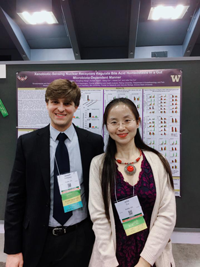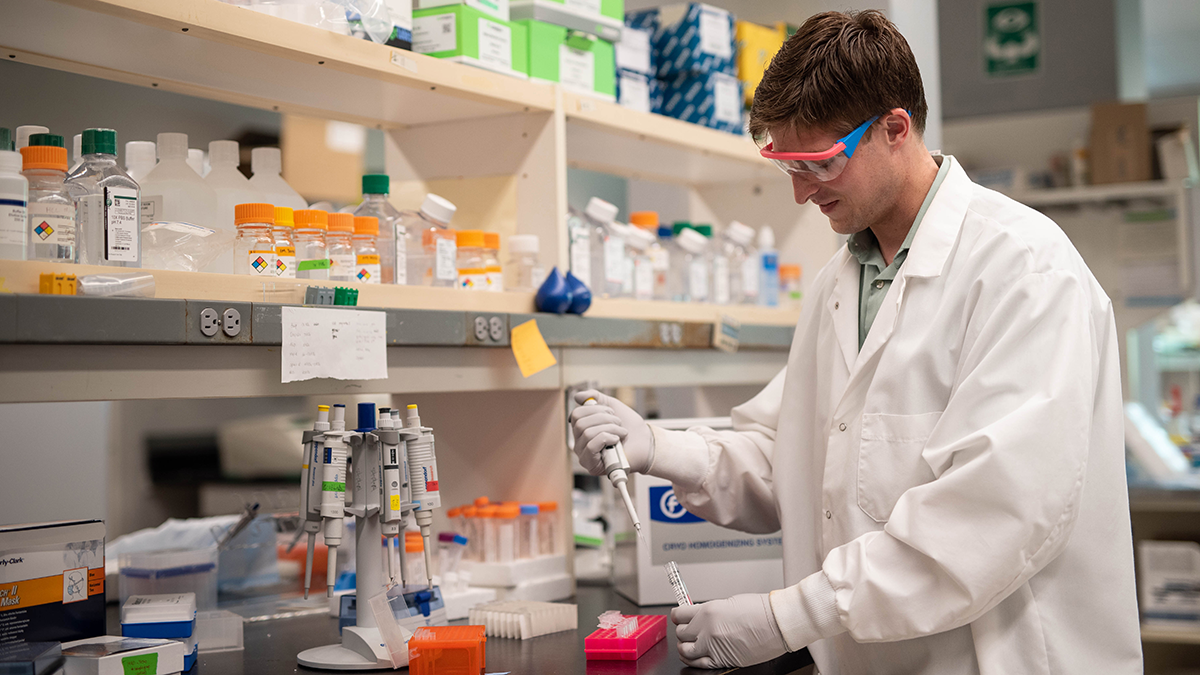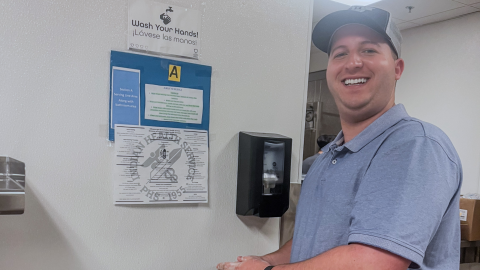Joseph Dempsey
PhD, Environmental Toxicology
Hometown:
Fort Wayne, Indiana
Future plans:
Continue working on research to improve how we prevent disease and promote well-being.
“I love public health because it goes beyond scientific discovery and pushes us to use what is discovered for a greater purpose.”
For Joe Dempsey, summers in Fort Wayne, Indiana meant one thing: baseball.
He and other neighborhood kids would find an empty lot, choose sides and improvise rules based on the number of players and the equipment available, playing until dark.
“The smell of fresh-cut grass still reminds me of summer,” says Dempsey, now a doctoral student in environmental toxicology in the UW Department of Environmental & Occupational Health Sciences (DEOHS), part of the School of Public Health.
This month, Dempsey was named the School’s 2019-20 Magnuson Scholar. He is one of six students from the UW Health Sciences schools who will receive $30,000 each for their education.
Sandlot ball taught Dempsey many lessons: dedication to learn the fundamentals; diplomacy to keep every player happy; imagination to think up different ways to play the game; and inquisitiveness to solve problems without adult supervision.
Now Dempsey is bringing this same creativity and curiosity to a different sort of sandlot. He is exploring the gut microbiome—what some have called “a scientific frontier”—to understand how this highly complex ecosystem shapes human health and disease.
Links to obesity, heart disease and more
The gut microbiome is the name given to all the microbes, fungi and viruses, along with their genetic material, that live in the intestine.
Our gut microbiota contain tens of trillions of microorganisms, including several hundred different species of known bacteria with more than three million genes. This ecosystem can affect everything from our weight and allergic responses to our mental health.
“There is so much we still don't know about the gut microbiome,” said Dempsey, who received his MPH from Indiana University Bloomington. “We need to think outside the box because we’re trying to imagine something beyond what is known, what is possible.”
Over the past decade, scientists have identified the gut microbiome as an important factor involved in obesity. Additionally, changes in the composition of gut microbiota have been linked to heart disease and neurodegenerative diseases such as Parkinson’s. Some speculate that if the microbiome is adjusted, it could decrease the risk for Alzheimer’s disease, atherosclerosis or diabetes.
Environmental exposures and the microbiome
What is less understood is how environmental exposures early in life can affect the gut microbiome and increase a person’s risk for these health outcomes. This is where Dempsey’s dissertation work comes in.
He is looking at how the gut microbiome and the liver develop together over time. The liver is typically the primary site of detoxification; however, the gut and its associated microbes play an important role in filtering and detoxifying materials not meant to be in the body.

He is also testing to see how early exposure to environmental toxicants and drugs might alter microbial communities in ways that could impact health later in life.
To do this, he uses both conventional mouse models (those that have a microbiome) and germ-free models (those that don’t have any bacteria). All of his work is done alongside his mentor Julia (Yue) Cui, an assistant professor of environmental and occupational health sciences, and other researchers in her lab.
“I feel that it is truly a blessing to work with Joe,” Cui said. “He is a highly motivated, ambitious and hard-working student who has already demonstrated great potential on the path to becoming a successful researcher and educator.”
Bacteria can be good for you
Dempsey’s lab studies and the work of several other research groups have shown that the presence of certain bacteria in the gut can impact our body’s ability to metabolize toxic chemicals or drugs.
The research focuses on an enzyme called cytochrome P450 3A4, which oxidizes small foreign molecules so they can be removed from the body.
“If certain bacteria are there, the expression of these enzymes could be really high, which means they're going to metabolize drugs and environmental chemicals at a higher rate,” Dempsey explained. “If the bacteria aren't there, the expression of these enzymes is a lot lower, so they are not going to metabolize these drugs very efficiently.”
This finding, among other research, pokes holes in the belief that all bacteria are dangerous. For centuries, humans have drawn a strong link between bacteria and illness, and for good reason. Deadly outbreaks from the bubonic plague to tuberculosis can all be traced back to these adaptive microorganisms.

However, mounting evidence has shown that the bacteria that make up our gut microbiome are crucial to our survival. The ultimate goal, according to Dempsey, is to show that certain bacteria are producing a therapeutic effect in humans.
“If we can do this, we would be able to target these specific bacteria in order to alleviate a certain condition,” he said. “Imagine a magic, natural pill of a bacteria that produces a metabolite that could prevent obesity or reduce diabetes risk.”
Voted Outstanding TA
This sort of research takes a lot of ingenuity and often requires scientists like Dempsey to make wild theories, only to try to disprove them.
When he has a creative block, Dempsey puts everything down and goes for a walk outside. In fact, Dempsey tries to spend as much time outdoors as possible. He enjoys going on runs, hiking and playing recreational sports.
Dempsey was voted by SPH students as the Outstanding Teaching Assistant last year. He is known for using environmental themes from popular culture, including Dr. Seuss’s “The Lorax,” to illustrate classroom lessons.
As a graduate research assistant in the Cui lab, Dempsey provides guidance to several undergraduate students.
“I like seeing the understanding in a student when they finally get it,” he said. “It’s a good feeling to know that a student understands something and that they can pass the knowledge on to someone else, especially in this public health field, where communicating about what you’re doing is so important.”




